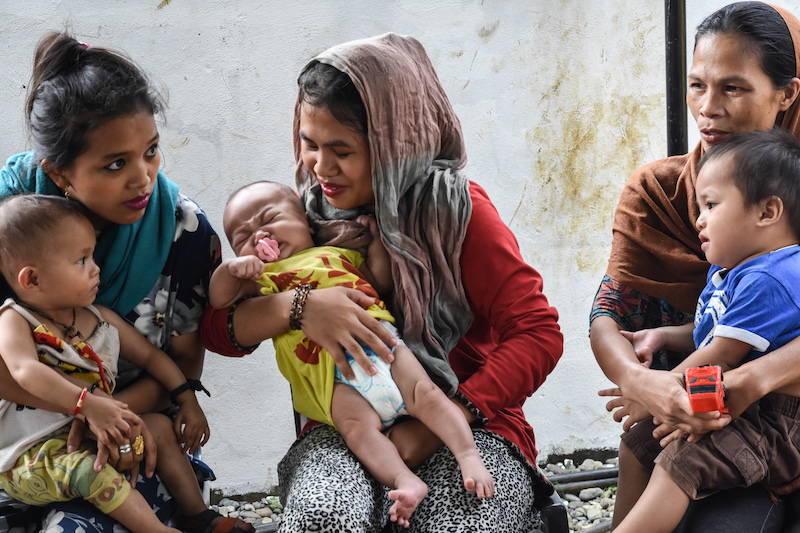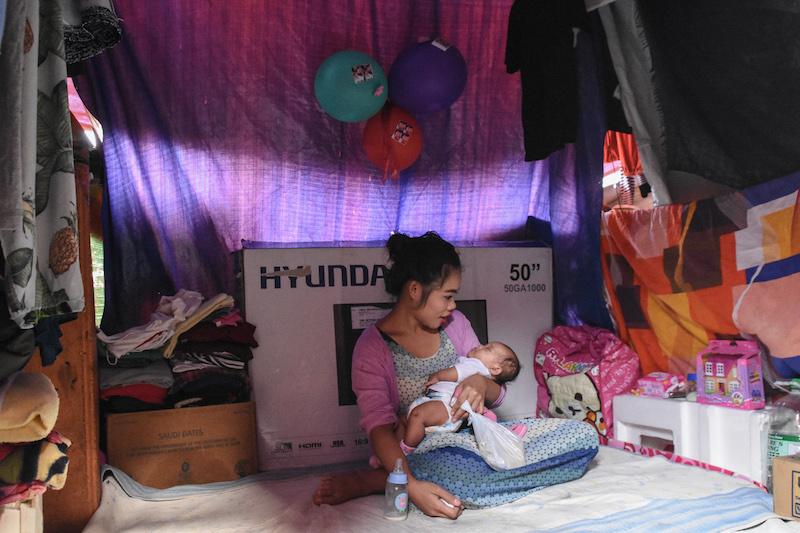Saguiaran, Lanao del Sur.
Rest is hard to come by in the evacuation center. Evacuees scream in their sleep throughout the night. Men, women and children relive in their dreams the horror they faced during the height of the siege. Running away from bombs and bullets. Getting grazed in the crossfire. Being separated from loved ones. Forcing the sick out of their beds. Witnessing dead bodies along the road while squeezing through evacuees exiting Marawi as thick as an ant’s nest. How can a survivor ever forget this nightmare? The wounds are many and deep. So the screams, they will not let up. Night after night.
Finding Order in Chaos
“I couldn’t handle them anymore,” Khalil says of the nightly screams and other problems in the center. “I have high blood and don’t want to die yet.” Khalil was a hardware store owner in Marawi City, and until recently, the elected leader of the evacuees here. He has been with his wife, five children and their spouses, and four grandchildren at the evacuation center for five months now. “We can’t wait to go home,” he says. “It’s better to live in a shanty on top of our wrecked house than live here in the evacuation center on charity.”
To address Khalil’s resignation as leader, the evacuees group themselves into four. One row is one group; each group’s leader is the group’s mediator. They confer with each other when conflicts among families arise. Order, it seems, is restored once again.
Among the group leaders are Jaaiel, 35, a driver and vendor with six children and Jalanie, 25, a carpenter and mason with four children. They chew cocoa nuts while chatting outside the barangay hall nearby. Jaaiel leads a group of 137 families while Jalanie works with 106. Part of what they do as group leaders is make the rounds in the center to ensure that all families receive adequate relief goods. When asked why the elected leaders are all men, they say, “Group leaders need to be strong and firm. Weaklings can’t survive doing what we do.” Jaaiel and Jalanie even intervene in conflicts between quarreling spouses and usually settle the matter by coaxing the husbands to listen to their wives. “Your wives are defenseless against your strength; their mouths are their only weapon,” they tell the husbands. A poster hanging on the stage reiterates this advice; it says Stop Violence Against Women.
 Mothers gather with their youngest children, some born in the evacuation center weeks after the siege. Photo by Louise L. Far
Mothers gather with their youngest children, some born in the evacuation center weeks after the siege. Photo by Louise L. Far
On the bleachers, men play chess, chat, or just sit watching everyone else around them. Below, some women in hijabs wear bright red and purple lipstick and cat’s eyeliner. Most of them wear no make-up and still look beautiful. Young mothers carry their babies on their hips. Children covered in snot and dirt, run and play. They push, shove, and hit each other but nobody interferes. A child lies on the floor, crying, and receives sideway glances from adults but nobody makes a move to help him up.
Another child appears and grabs Louise’s camera wanting her to take a picture of him. As our official videographer, Louise obliges, and goes with him to a corner, takes several shots, and shows them to him. He smiles then leaves. “He just wanted me to see him,” Louise reflects. This lonely child in a crowd. Here it’s hard to make any real friends.
Kindness in Uncertain Times
Noradin, 40, used to be a successful make-up artist, fashion designer, and events coordinator back in Marawi. He shows a picture of one of his winning beauty pageant gowns made from marang leaves to prove he is really talented. Now, in the evacuation center, he is jobless like everyone else and fills his time helping “whoever wants help.” He adds that “I would go crazy sitting around waiting for ‘relief’ and doing nothing…”
One of those Noradin helps is nineteen-year-old Fatima whose one-month-baby was born in the evacuation center. She and her in-laws do not get along well. She says her mother-in-law bullies her and her husband. “She even turns her husband against his son, my husband,” she continues. Because of the family quarrel, Fatima needs to live away from her in-laws. Thanks to Noradin, Fatima now stays in a new room at the far end of the court — with her little family.
Noradin has given up his space for Fatima and her new baby. The offer has been accepted by both Fatima and her in-laws. “I’ve been warned though that if something bad befalls Fatima’s husband, I’m going to be the first suspect – because I’m gay,” Noradin says. “But Fatima’s husband is like a brother to me! I just really want to help.”
A sign that says: “Do not enter if not invited,” hangs at the door of Fatima’s new room. She lays her baby down in the center of the tiny room while guests remain standing outside because there’s not enough space for everyone. “I made our home look like my old bedroom,” she says and I notice, in the dark, the pictures and decorations she’s placed on the walls. “My baby’s father and I fight sometimes and he leaves or I leave but we can’t stay away too long because our belongings might get stolen.”
Noradin has helped many at the evacuation center yet he says, “Even if I give everything, I’m not enough and people say, ‘Don’t listen to him, it is futile’.” His persistence has been rewarded with a clean drinking water system for the evacuation center. The feat has inspired him to volunteer and help two relief organizations monitor the well-being of the evacuees. “I’m a leader and I’m educated,” he proudly says.
Working Against Hunger
Many husbands and fathers in the evacuation center used to have steady money. They would come home to their families after a long day at work. These days, though, there is no source of income at all and they cannot face their hungry families. It is disempowering for the men to watch their families live a hand-to-mouth existence and rely on relief goods day in and day out. It’s been five months of living in uncertainty and being unable to provide life’s basic necessities – no shelter, food, water, and clothes – because there’s no work, no money.
 Fatima, one of the evacuees, with all her family’s belongings inside the one-room home she shares with her newborn and husband in the covered court turned evacuation center in Lanao. Photo by Louise L. Far
Fatima, one of the evacuees, with all her family’s belongings inside the one-room home she shares with her newborn and husband in the covered court turned evacuation center in Lanao. Photo by Louise L. Far
One resourceful woman sits beside me one day looking very gaunt, busily sharpening some sticks to make into knitting needles so she can make cellphone cases and earn additional income. She’s Anisah, 40, and used to sell hotcakes in Marawi which she cooked in her small oven. Now she turns rags into floor mats to earn a living. She says her entire savings of P20,000 is missing from its hiding place in the small room where she and her children stay. Their remaining canned goods from the Department of Social Welfare and Development (DSWD) will only last them for just two days more. Their rice container is almost empty. Her children, whose names and birthdays she reads off from a list lest she forgets, are always hungry. “Before the war, we did not know hunger but now we do,” she laments.
How hungry are the children? One child, spotting our bunch of bananas, politely asks for one piece and becomes overjoyed when it’s given to him. Other children see his good fortune and ask for a banana too. Suddenly there’s a whole group of them asking for bananas. Because there are not enough bananas to go around that day, the children wait until the next day to get theirs. A circle is formed with the parents and their children. They sing together after which each child receives a banana. From their faces, one can tell how the precious fruits are the most delicious thing they have tasted in a long time.
Anisa’s children could look after themselves then. “Now they sleep in their clothes and need to be told to wash themselves.” Anisah doesn’t understand why they’ve become so hard-headed and worries over them constantly. “When I call them, they don’t hear me or don’t want to hear me, I don’t know. I have to go to them and touch them so they notice me.”
The solution according to group leaders Jaaiel and Jalani is for the evacuees to be given jobs. “We all have many plans, but no capital. If only we have jobs!” they mutter. The men share that DSWD’s ‘cash for work’ incentive pays evacuees Php 200/day for cleaning up around the evacuation center. But the ‘cash for work’ program only lasted two weeks in Saguiaran. With the cash earned, some evacuees set up sari-sari stores. Most evacuees though are back to subsisting on relief and wish the ‘cash for work’ incentive returns. Its major set back, however, is that now, evacuees expect to be paid for cleaning up their own surroundings. “It’s very hard to mobilize evacuees for brigada clean-up drives,” Jalanie says. “Nobody wants to clean up for free anymore.”
For three days at this evacuation center, I witness how one of the poorest regions in the country is striving to give relief the best way it knows how to families under siege. The main star is the government agency in charge of coordinating and distributing the relief goods, never mind if it lacks social workers and fails to be on top of every little detail. Maybe explore holistic and integrative approaches to solving disaster instead of the current band-aid approach? Clearly, not all relief is relieving. Sometimes we need to work harder and be more resourceful in providing relief that’s necessary albeit not immediately accessible. Take it from the organizations already engaged in holistic and integrative approaches with much success but just don’t have adequate funding. It’s time to show the world we Filipinos can take care of each other and find creative solutions to our problems.
Author’s note: Creating Sinag Within’s two missions in August 2017 and in October 2017 have helped approximately 600 siege survivors in three evacuation centers located at the periphery of Marawi City. For more information about how to support the next activities of Creating Sinag Within, visit facebook.com/creatingsinagwithin or contact the Founder and Director, Rosan Aliya Agbon at creatingsinagwithin@gmail.com)
